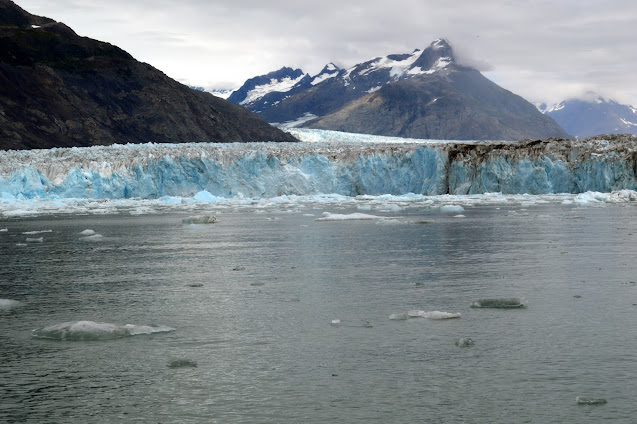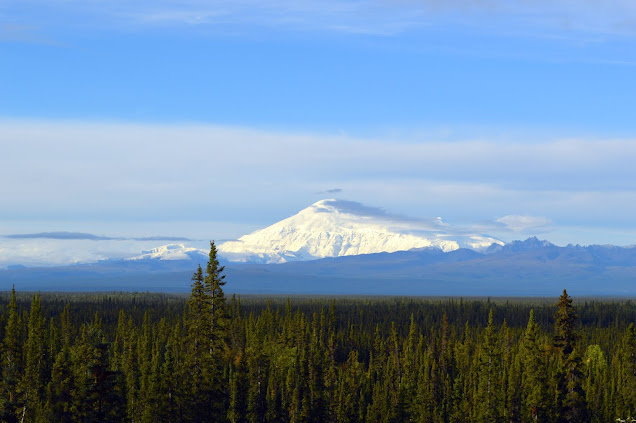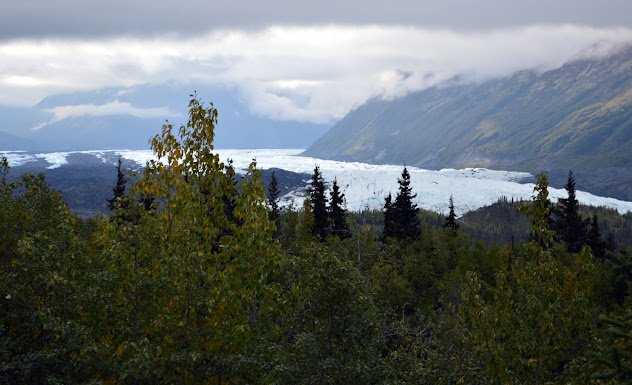Does Climate Change Increase Earthquakes and Volcanic Activity?
Something many people aren't aware of is just how climate change is affecting natural disasters once thought to have no connection to weather and/or climate - earthquakes and volcanic activity. Unfortunately, these two phenomena are predicted to also get much worse over time due to isostatic rebound caused by the melting of the ice sheets and glaciers. A new study demonstrates this rather well; but an even gloomier study also explains how this issue can also affect the release of methane hydrates. Methane hydrates are a mixture of methane and ice held in place by temperature and pressure. They are also known by various other names, quote:
"Several other names are commonly used for methane hydrate. These include: methane clathrate, hydromethane, methane ice, fire ice, natural gas hydrate, and gas hydrate. Most methane hydrate deposits also contain small amounts of other hydrocarbon hydrates. These include propane hydrate and ethane hydrate."
So, these predicaments by themselves interact with several other predicaments and are threat multipliers. Another study points out how melting glaciers contribute to earthquakes. As most people well know, melting glaciers and thawing permafrost also cause sea level rise, increased carbon emissions, landscape slumps, thermokarst lakes and depressions, and many other issues covered in the file on the cryosphere. Sheesh, just these two paragraphs in and of themselves are a feast for research into positive feedback loops!
Another study shows how isostatic rebound can also affect ice sheets grounded in the ocean. So, adding volcanoes and earthquakes to the list of effects climate change exacerbates and knowing that climate change is caused by ecological overshoot, this means that there are even far more disasters we have to look forward to in the future than previously thought.
One more article I wrote brings the methane threat into focus more clearly along with discussion as to precisely what is at the root of our unsustainability. As usual, it also goes into detail regarding human psychology. One more brand new study shows how phytoplankton produce significant amounts of methane and one paragraph caught my eye due to the mention of a positive feedback loop, quote:
"Phytoplankton, consisting of eukaryotic planktonic organisms and Cyanobacteria often form massive blooms—mass developments in the photic zone of lakes and oceans, a phenomenon drastically enhanced in the last decades due to global warming (Paerl and Huisman, 2008; Visser et al., 2016) and anthropogenic eutrophication (Glibert et al., 2014). This is likely to enhance global warming by releasing more CH4, and consequently increase the frequency, intensity and duration of phytoplankton blooms, resulting in a positive feedback loop that further speeds up global warming (Fig. 3). Although the larger the bloom the more CO2 (Ullah et al., 2018) is likely to be sequestered, the added biomass eventually leads to hypoxia, the formation of dead zones and consequently may lead to further CH4 release from classical methanogenesis (Beaulieu et al., 2019; Fig. 3) as well as other even more potent greenhouse gases as nitrous-oxide (N2O) (Breitburg et al., 2018)."Needless to say, those who make claims that methane isn't a serious threat or that just because fossil fuel use is in decline means that emissions will decline from here on out haven't spent enough time looking into natural emissions across the board (not just methane, but ALL greenhouse gases, and from ALL sources; including unintentional emissions caused by accidents such as infrastructural failures caused by climate change and extreme weather events and other natural disasters exacerbated by climate change such as volcanic activity, wildfires, and earthquakes, landslides, floods, droughts, and land subsidence [also caused by drought indirectly through the pumping of aquifers for water]).
This post comes very close to the upcoming COP-26 meetings, and William Rees has a warning, quote:
"Do not expect significant progress from COP-26 on climate change mitigation. There are fundamental barriers that prevent the deep and rapid changes that scientists advocate. Most countries adhere to economic growth policies - which create ecological overshoot. Unless and until we accept that we must live within ecological limits, then climate change will not be adequately tackled. Energy and resource consumption must be addressed through controlled economic contraction."Furthermore, the contraction of humanity is inevitable, so all genuine options exist within this framework, whether we respond appropriately or not. And finally, every day that we ignore this reality, the deeper humanity falls into the overshoot rut, the faster the feedbacks take over (forest fires, methane from melting permafrost), and the less chance we have of mitigation."














Erik continuing to bring us his ‘Inconvenient Truths.
ReplyDeleteAdded below, thx mate;
https://kevinhester.live/2016/07/31/isostatic-rebound-and-our-rocky-future/
Re the overpopulation issue: “In reality, the global human population is not increasing exponentially, but is in fact slowing and predicted to stabilise at around 11 billion by 2100. More importantly, focusing on human numbers obscures the true driver of many of our ecological woes. That is, the waste and inequality generated by modern capitalism and its focus on endless growth and profit accumulation.”
ReplyDeletehttps://theconversation.com/why-we-should-be-wary-of-blaming-overpopulation-for-the-climate-crisis-130709
Thanks for that clarification; if one Googles the "Great Acceleration" and looks at all the charts and graphs, one will notice the exponential trends in each one, and they are all caused by overpopulation, overconsumption, and overshoot. Population growth has, in fact, slowed. I edited slightly that paragraph to reflect the fact that overpopulation alone should not be blamed for overshoot.
DeleteIn answer to the question:
DeleteDoes Climate Change Increase Earthquakes and Volcanic Activity?
the simple answer is Yes. Even pre-climate collapse geologists were looking at using methane leaks to warn of earthquakes, as there appeared to be a correlation.
Now we know about Isostatic Rebound, caused by gigantic ice melt and shifting of centres of gravity of oceans. Not that I think they'll happen until after we've gone beyond the point where we can measure these things. but I can imagine a scenario where the Greenland ice melt allows the tectonic plate to rupture upwards, severing Iceland in two, and causing Ireland to slip below the sea towards the Porcupine Trench, where in May 2018 CAMs showed methane plumes pouring upwards. Which is kinda weird, as the trench is deep, and deep methane emissions would be absorbed before they reach the surface; there is no industry there; so I could only conlcude at the time that a mass die-off had occured out there.
I think you'll find that, yes, the percentage rate of population growth has slowed, from 2.1% in the 1970s to 1.6% today, I think the figures are, but due to the sheer size of the population we adding 10 million more people to the planet annually than in the 1970s. Currently c81 million a year, or 1 million every 4 days, that's net after deaths, even allowing for Covid.
15th October 2021 6pm GMT should have been headline news, that was when the population passed 7.9 billion.
https://www.worldometers.info/world-population/
1 billion planet eaters and 6.9 billion planet-nibblers, it doesn't matter the ratio, it's still around 7.4 billion above sustainable carrying capacity. And that is on a fully functioning planet, which we no longer have. A recent report showed that only 3% of the planet is untainted by mankind in some form or other.
The 1972 Limits to Growth business-as-usual charts have been pretty much spot on, so far, and show population will peak c2025-27, probably at 8.4 billion, and sharply decline by half with 40 years. I seriously doubt we will ever see 11 billion people at all.
As this paper points out:
https://www.sciencedirect.com/science/article/pii/S0016328719303507
we can't do agriculture in an unstable climate, so how are we gonna feed the existing 7.9 billion, never mind another 3.1 billion on top of that? Just ain't gonna happen!
Keep going Erik, please keep it going.................
ReplyDeleteYes, please continue with your very important work!
ReplyDelete